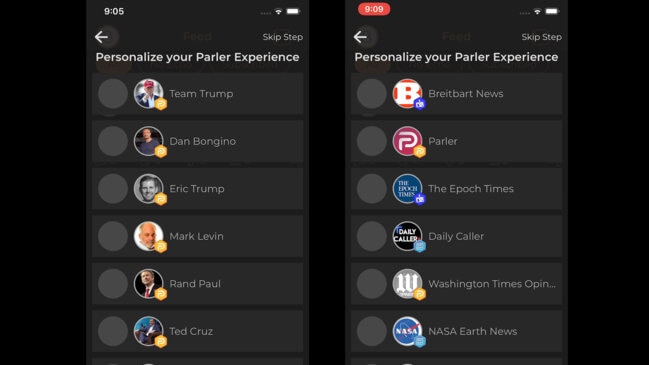Conservatives flee to Parler after Facebook‘s US election crackdown
Twitter recently confirmed Donald Trump would lose social media protections against moderation. Here’s where he might go.

Conservatives fed up with a perceived bias from social media platforms like Facebook and Twitter are reportedly absconding to “free speech platform” Parler, but the site really needs one more thing to push it into the mainstream.
“If someone like Donald Trump, a very popular figure with a huge audience, moved to the platform, that could be huge for them and actually attract a more diverse audience,” said Griffith University PhD researcher specialising in digital media and political extremism Audrey Courty.
Parler’s CEO is John Matze, a self-described libertarian, with financial backing from noted conservative Rebekah Mercer, who wants the platform to fight back against what she called the “ever increasing tyranny and hubris of our tech overlords” in a post on the platform.
RELATED: Twitter protection Trump will lose

RELATED: Twitter suspends Trump campaign ad
The social media platform was founded in 2018 but is reportedly receiving a surge in popularity in recent weeks.
Conservatives have been arguing for years they aren’t treated fairly by social media platforms, though the evidence for this is largely anecdotal.
Right-leaning media outlets and politicians are regularly among the top performing posters on Facebook, and while the platform has occasionally removed “extremely online” far-right figures like Alex Jones and Laura Loomer, they can usually point to a violation of a policy as the reason.
Facebook’s automated moderation processes also frequently make mistakes, including sometimes restricting people’s accounts for no reason at all.
While some conservative figures have joined Parler out of protest against Facebook and Twitter (or because they’ve already been banned from there), the site still needs voices with sizeable real world influence to gain traction.
Ms Courty said Mr Trump would not only bring in his supporters, but also the media to monitor what’s being said and those from the other side of politics to challenge them.
RELATED: Instagram’s US election fail slammed

WHY IS THIS HAPPENING NOW?
According to The Wall Street Journal, which recently reported on Ms Mercer’s investment as a lead investor for Parler, the site’s popularity has surged, with users more than doubling to 10 million.
Ms Courty said the site only had around 1.5 million users in July, and those were claims of the company’s CEO she was unable to verify.
Parler is not a public company (yet) so unlike Facebook and Twitter you won’t find user numbers disclosed in annual reports or filings with financial regulators, but the app’s recent trending popularity on the Google Play and Apple App Store support the reported uptick in activity.
Unlike Facebook and Twitter, Parler also hasn’t been taking any action against what Ms Courty called posts that “are seeking to delegitimise or question or criticise the election process in the US and its result”, many of which have come from Mr Trump himself.
“At the moment that seems to be the major draw,” Ms Courty said.
RELATED: Facebook’s plan to stop Trump ‘win’

Ms Courty said it was “unclear” whether there were any actual differences between the moderation of Facebook, Twitter and Parler, because the latter still moderates things like spam and sexually explicit content, and previously took action against users with “offensive names”.
“Like Facebook and Twitter a lot of these terms and conditions are worded very vaguely to give them leeway about what content they moderate or don’t moderate,” Ms Courty said.
“Free speech doesn’t mean no moderation, there’s always going to be some level of moderation. I just think it might be a marketing strategy at this stage.”
But it’s unlikely to remain the dominant marketing strategy for long, because the market it targets is only so big.
“They want to grow, they are a business, it’s not really in their interest to be far-right leaning.
“It might potentially be a strategy as they try to ride the popularity, and it could be very successful.”
Mr Matze himself has previously sought to avoid the platform turning into a right-wing echo chamber, even trying to entice “liberal” pundits with more than 50,000 followers on Facebook and Twitter with a bounty for joining Parler back in June.
The bounty, to be awarded to the user who got the best engagement, was quickly doubled to $US20,000 ($A27,400) due to a lack of interest and it’s not clear if it’s been paid yet or ever will be.
Ms Courty said it was “concerning … regardless of your political opinions” that the echo-chamber effect of only listening to people we already agree with was now spreading to choice of social media platform.
“We’re already not speaking the same language. We’re not basing our analyses on the same sorts of information. We’re not basing our analyses on the same facts. We don’t share the same facts.”
She said the idea of people picking which facts to believe was “very problematic for having constructive political debate”.
“We’re so polarised now because we don’t even have common information to have debates around. Now we’re seeing this on the level of social media platforms. Your choice of platform could potentially completely silo you off … we’re not sharing a common reality any more.”



